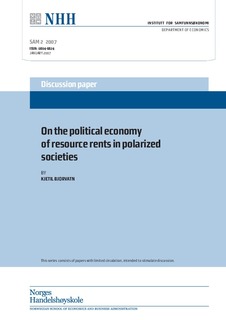| dc.contributor.author | Bjorvatn, Kjetil | |
| dc.date.accessioned | 2007-05-22T08:46:35Z | |
| dc.date.available | 2007-05-22T08:46:35Z | |
| dc.date.issued | 2007-01 | |
| dc.identifier.issn | 0804-6824 | |
| dc.identifier.uri | http://hdl.handle.net/11250/163048 | |
| dc.description.abstract | The present paper analyses how resource rents may affect political
outcomes in a polarized society, where groups hold conflicting views
on economic policy. A politically dominant group decides whether or
not to include the opposition in the national political process. The
weaker group chooses whether to remain in the union or secede. The
analysis finds that the effect of resource rents on social and political
outcomes depends on the social environment, in particular the degree
of polarization in society. Moreover, the study shows that this relationship
may be non-monotonic, with increases in resource wealth
stimulating peaceful cooperation for some initial levels of wealth, and stimulating conflict and division for other initial levels of wealth. | en |
| dc.language.iso | eng | en |
| dc.publisher | Norwegian School of Economics and Business Administration. Department of Economics | en |
| dc.relation.ispartofseries | Discussion paper | en |
| dc.relation.ispartofseries | 2007:2 | en |
| dc.subject | natural resources | en |
| dc.subject | polarization | en |
| dc.subject | conflict | en |
| dc.subject | democracy | en |
| dc.subject | dictatorship | en |
| dc.subject | regional autonomy | en |
| dc.title | On the political economy of resource rents in polarized societies | en |
| dc.type | Working paper | en |
| dc.subject.nsi | VDP::Samfunnsvitenskap: 200::Økonomi: 210::Samfunnsøkonomi: 212 | en |
